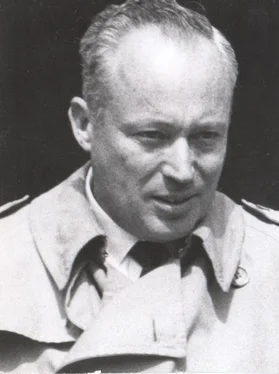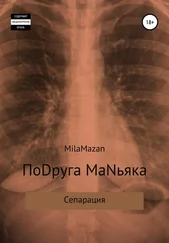“They tell me it’s like a nightmare in there,” Von Epp said.
“I don’t understand this at all. Most of these troops have performed well on the eastern front ... I simply don’t understand it.” Horst’s mind was back on the women. Alfred Funk’s was not “We have to get them off the roofs,” he said. “Must get them down on the ground ...”
The phone rang. Funk answered. He turned sallow and clapped his hand over the mouthpiece. “Himmler calling from Berlin.” Alfred Funk lifted his latest reports and read passages, spoke of German devotion and courage, gave assurances. Then he became quiet and listened and listened. His shading turned to crimson and then to gray. He placed the receiver on the hook very, very slowly.
“News of this insurrection has spread all over Europe. Hitler has been in a rage all day.”
Horst von Epp’s hand clutched his throat unconsciously.
“Damn! Damn!” Funk walked to the window in a violent anger. “Damn their filthy Jew souls!”
He whirled to Horst. His face was a mask of evil. Von Epp was frightened.
“What are you going to do, Alfred?”
“I’ll get these filthy animals down from the roof. I shall burn the ghetto to the ground!”
Chapter Eighteen
“HEINKEL BOMBERS!” CRIED THE Fighters on the roofs.
The German airplanes swooped in at a height of two hundred feet over the Brushmaker’s and slowed their speed. Tons of black bombs fell from their opened wombs on the crush of buildings. They hurled down, tore through the roofs, splattered on the streets, ignited.
The incendiaries smoldered and their groping flames licked around for fuel. The wood spurted into sudden fire and roared up the stair wells to the roofs.
“The ghetto is burning!”
The Heinkels zoomed in on a second and a third pass. There was nothing to shoot back and deter their “drill” with human targets. Palls of smoke billowed and spiraled heavenward and flames leaped on the roofs, turning them into frying pans. Glass windows exploded and scattered on the streets, and orange-and-red fingers of flame leaped violently through the windows.
A scorched runner spilled into the bunker at Mila 18, holding his blackened hands, and another with wild eyes came in, and another. All of them had the same story.
“We have to abandon the roofs.”
The ghetto burned crisply, concisely, and helplessly, for there was not so much as a single drop of water to stop the conflagration. Fire, a hungry beast, devoured all that would succumb and relentlessly searched for more.
Warsaw’s fire brigades surrounded the ghetto with power hoses ready. Orders: keep the flames locked in on the Jews. Occasionally an angry spark would leap the wall and ignite on the Aryan side. These fires beyond the wall were quickly stamped out. Not a single drop of water went into the ghetto.
At the end of the tenth day of the uprising the northern quarter of the ghetto was in flames.
On the tenth night the new artillery battalions went to work. They poured five thousand rounds of artillery fire from the mouths of their cannons over the wall at point-blank range. Debris flew in the wake of the shell fire. Walls that refused to fall to fire were blasted apart.
Blam! Blam! Blam! Blam! bellowed the German guns.
The earth shook and windows rattled and the muzzles flashed lightning and no one slept in Warsaw.
Blam! Blam! Blam! Blam! they reached out at the silhouettes outlined in the fire. Blam! Blam! Blam! Blam! until daylight.
And then the Heinkels came back and showered more coals into the inferno, and the fire raced from house to house, leaped over intersections, block to block. The tightly packed poor Stawki area raged, and the fire raced down Zamenhof, up Niska, along Mila, along Nalewki, devoured the Brushmaker’s complex.
Immense belches of violently twisting columns of smoke streamed skyward and turned into yellow-black clouds and blocked the sun and turned day into night. Showers of soot rained down thickly, covering the city with a snowfall of ashes. Everything was an ugly disintegrating gray.
One by one Simon called his groups down from the roof. The very key to their defenses were burned from under them. Fighters whom the Germans had been unable to force down were now driven out by the ever-probing, darting flames.
The wall of fire billowed down Zamenhof and encircled and ate the Civil Authority building and ran down Gensia, once a commercial artery of Warsaw, and the Pawiak Prison erupted like an immense torch.
Easter Sunday!
The mighty organ of the cathedral bellowed a tribute to the resurrection of the Son of God. The confines of the cathedral and of every church in Warsaw were overrun with pious who knelt, crossed, prayed, Hailed Mary, dipped holy water. Choir boys with shiny faces sang out to the glory of the Lord in falsetto voices.
The flames from the ghetto warmed them and caused the pious to perspire profusely, but they pretended no discomfort, for this was a joyous time.
“Hail Mary, full of grace ... Mother of God ...”
Gabriela Rak knelt in the last row of the mighty tabernacle. She had wept until she had no more tears. A coughing broke out in the cathedral as a wind shift sent gusts of smoke from the ghetto racing down to the altar.
Gabriela looked up at the bleeding, limp Christ. The archbishop chanted prayers rapidly in Latin.
“Oh my God,” Gabriela whispered to herself. “My hatred for these people around me knows no bounds. Help me, God. Help me not to hate them ... help me not to hate ... please let my child live. My child must live, but I am afraid because of my hatred. O Jesus ... how can you do this to your own people?”
Gabriela knelt alone after the cathedral was empty.
It was a bad day for an Easter Sunday. The gardens and the Vistula River and the places where one celebrates the resurrection and the coming of spring were simply unbearable because of the damned fire inside the ghetto. Soot poured down on their clothing, and it was humid and dark. A perfectly wonderful day was being ruined.
“O Jesus, Jesus, Jesus. Why are you making them suffer?” Gabriela moaned. “Help me, help me. Help me not to hate.”
In deference to the holy day, the fire brigade poured their water jets over the ghetto wall to keep the Convert’s Church from falling to the flames as they reached the southern boundary.
Easter night.
Fires lit the sky from the Convert’s Church on the south to Muranowski Place on the north; from the cemetery on the west to the Brushmaker’s on the east. All of the ghetto blazed.
Horst von Epp stood transfixed before his window and watched. A naked oil-covered girl lolled on the bed behind him. He was drunk as he had never been drunk. He hung onto the curtain.
“Fire is fascinating,” the girl observed.
“That is no fire. That is hell. That is hell the way the devil meant it to be!”
“Horst be a good boy. Close the curtain and come to bed.”
“Hell!” He poured a drink sloppily. It ran over the edge of his glass and down his arm. “I salute our thousand-year empire! See it! See it! We shall live in fires like that for a thousand years! We are cursed!”
He turned and looked at the girl wildly. “Cursed, damned ...” The shadows of the flames crisscrossed her body.
“You frighten me,” she whimpered.
“Get out, you slut!”
Inferno! Inferno! Inferno!
Large beams devoured by the fire plunged from the roofs through floors. Choking, gagging, blinded Jews scrambled dazed into the streets and walked in helpless circles. Jews hurled their children from windows and then themselves. Jews were crushed and buried under collapsing walls.
On the thirteenth night of the rebellion the artillery began again to make up for its one-day Easter holiday.
Читать дальше












